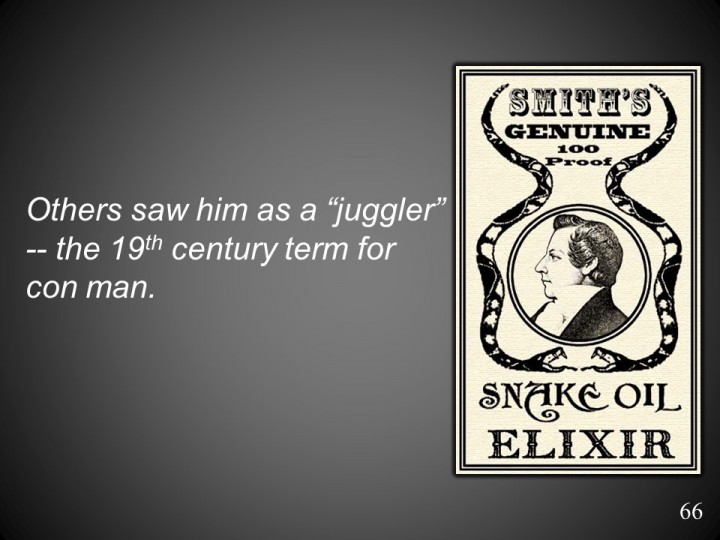“At length, Joseph pretended to find the gold plates. This scheme, he believed, would relieve the family from all pecuniary embarrassment. His father told me that when the book was published they would be enabled, from the profits of the work, to carry into successful operation the money-digging business. He gave me no intimation, at that time, that the book was to be of a religious character, or that it had anything to do with revelation. He declared it to be a speculation, and said he: ‘When it is completed, my family will be placed on a level above the generality of mankind.’”
http://solomonspalding.com/docs/1834howf.htm
June & July, 1830. Parody of the Book of Mormon (“Book of Pukei”) published by Dogberry:
“Walters the Magician, who has strange books, and deals with familiar spirits; peradventure he will inform us where the Nephites, hid their treasure… Walters, the Magician [heeds]… the summons of the idle and slothful, and produced an old book in an unknown tongue… from whence he read … strange stories of hidden treasures and of the spirit who had custody thereof. And the prophet answered and said, — “Behold! hath not the mantle of Walters the magician fallen upon me, and I am not able to… shew you… where the Nephites hid their treasures?… Knowest thou not… that this same Mormon wrote a book on plates of gold… chosen to interpret the book, which Mormon has written, to wit, the gold Bible?… I will send thee an assistant, even Oliver, the pedagogue…”
From Mormonism Unvailed (1834), p. 251-252:
I, Henry Harris, do state that I became acquainted with the family of Joseph Smith, Sen. about the year 1820, in the town of Manchester, N. York. They were a family that labored very little — the chief they did, was to dig for money. Joseph Smith, Jr. the pretended Prophet, used to pretend to tell fortunes; he had a stone which he used to put in his hat, by means of which he professed to tell people’s fortunes. Joseph Smith, Jr. Martin Harris and others, used to meet together in private, a while before the gold plates were found, and were familiarly known by the name of the “Gold Bible Company.” They were regarded by the community in which they lived, as a lying and indolent set of men and no confidence could be placed in them. The character of Joseph Smith, Jr. for truth and veracity was such, that I would not believe him under oath. I was once on a jury before a Justice’s Court and the Jury could not, and did not, believe his testimony to be true. After he pretended to have found the gold plates, I had a conversation with him, and asked him where he found them and how he come to know where they were. He said he had a revelation from God that told him they were hid in a certain hill and he looked in his stone and saw them in the place of deposit; that an angel appeared, and told him he could not get the plates until he was married, and that when he saw the woman that was to be his wife, he should know her, and she would know him. He then went to Pennsylvania, got his wife, and they both went together and got the gold plates — he said it was revealed to him, that no one must see the plates but himself and wife. I then asked him what letters were engraved on them, he said italic letters written in an unknown language, and that he had copied some of the words and sent them to Dr. Mitchell and Professor Anthon of New York. By looking on the plates he said he could not understand the words, but it was made known to him that he was the person that must translate them, and on looking through the stone was enabled to translate. After the Book was published, I frequently bantered him for a copy. He asked fourteen shillings a piece for them; I told him I would not give so much; he told me had had [sic] a revelation that they must be sold at that price. Sometime afterwards I talked with Martin Harris about buying one of the Books and he told me they had had a new revelation, that they might be sold at ten shillings a piece. State of Ohio, Cuyahoga County, ss: Personally appeared before me, Henry Harris, and made oath in due form of law, that the foregoing statements subscribed by him are true. JONATHAN LAPHAM, Justice of the Peace.
BYU historian Marvin S. Hill:
“Now most historians, Mormon or not, who work with the sources, accept as fact Joseph Smith’s career as village magician.”
Quinn, Early Mormonism and the Magic World View (1998), p. 59.
